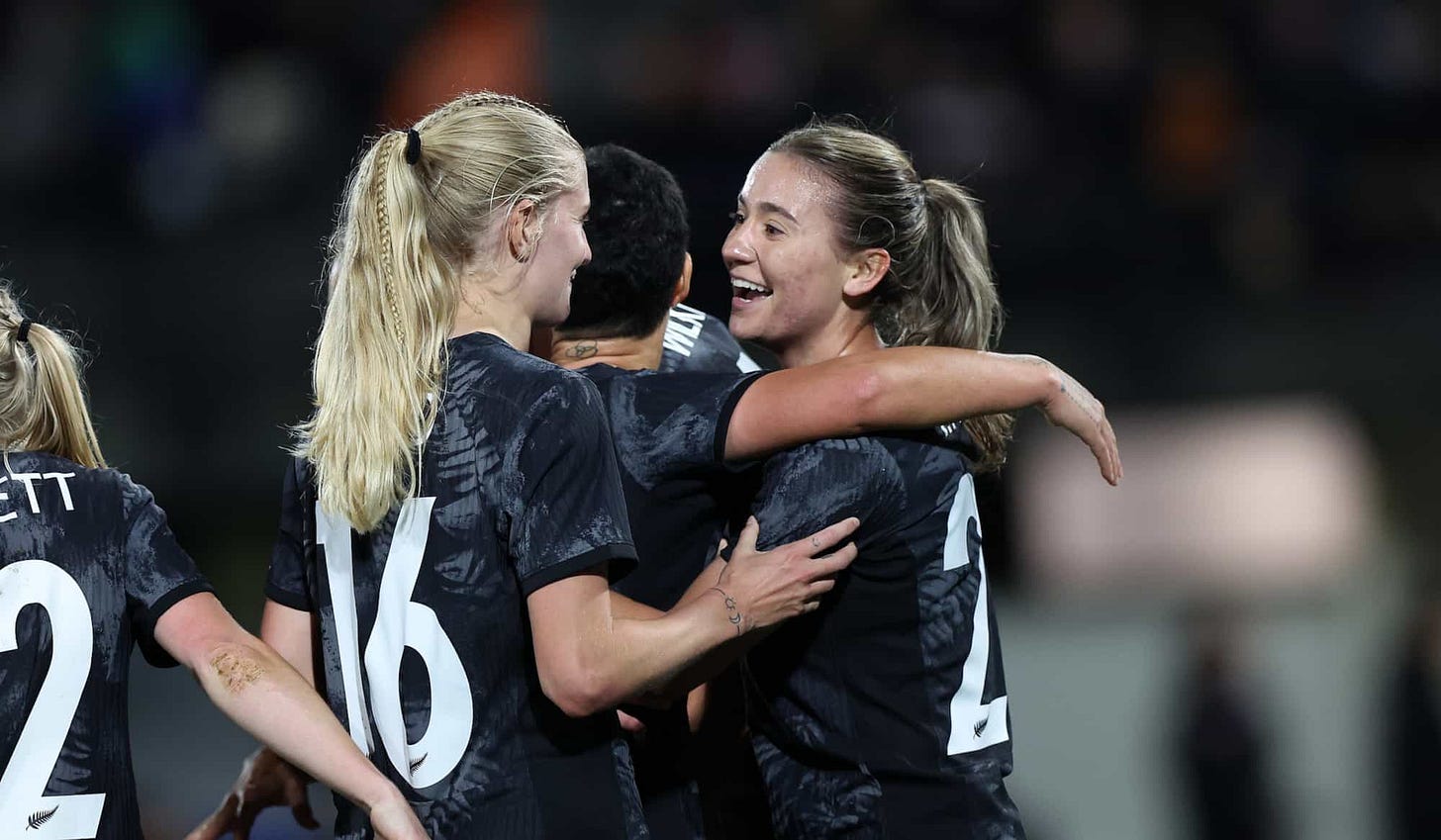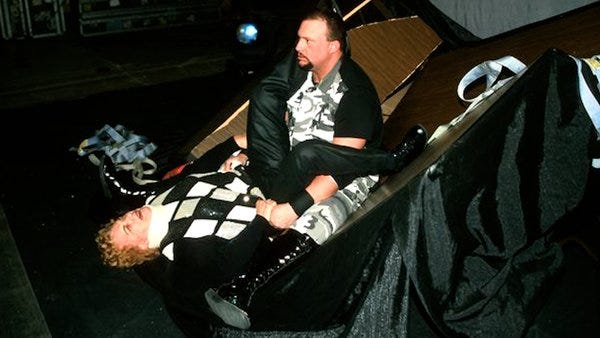FIFA Women's World Cup: Leaving misogyny in the past to join the best party in football
A reformed football misogynist wants to know if it's OK to join the party now he's stopped being part of the problem?
There is a video that has long been in circulation online highlighting the analysis of the 1998 Women’s FA Cup final by then Sky Sports presenters Richard Keys and Andy Gray. The clip from Monday Night Football shows the TV station’s one-time dream duo guffawing their way through the highlights of Arsenal’s 3-2 win over Croydon.
Admittedly, the package details a quite bizarre set of error-strewn goals which eventually led to the Gunners being crowned champions. But Keys and Gray abandoned all sense of professionalism and snigger like silly schoolboys throughout at the perceived hilarity of this novel concept - women’s football.
But here’s the thing, so did I. And I bet a lot of men my age, as well as older or younger, did or still do the same.
Now, 25 years later, there’s a party going on. It’s a party we were too belligerent to be on time for. Now, sober and cognisant, a lot of us want in. But should we be allowed entry?
The party in question is women’s football. More specifically, the FIFA Women’s World Cup, which kicks off three hours up the road from me this evening in Auckland, New Zealand.
The game at Eden Park between the Football Ferns, the hosts, and 1995 champions Norway will set a record for a soccer attendance in Aotearoa. That’s any football match - male or female - and continues the incredible and seemingly unstoppable ascent of the women’s game’s popularity.
For me, a 34-year-old straight white guy from Middle England who previously held an outwardly misogynistic opinion of women’s football, I have to accept some culpability in how long it has taken for me to buy into women’s football. This will be my first ever Women’s World Cup in which I watch the games. For a self-confessed football fanatic, this is simply not good enough.
Women’s football now has me engaged and enthralled. There’s a version of my game, the beautiful game, where fans aren’t regularly having their head kicked in? Where sexuality is not one-dimensional? Where children attending aren’t subjected to hearing chauvinistic chanting?
This is not the game I fell in love with. But I wish it was.
Growing up my entertainment informed me that women could be shrieking mums, nagging partners or manic pixie dream girls. Not much else. Movies like The Matrix and Fight Club told me any sad sack could be special. Wrestling and music videos informed me women could be objects of male desire. The former even suggested I could powerbomb them through tables.
Then there was football. Football was my life from the moment I got my first Match magazine and a shiny Slaven Bilic for a 1997 Panini sticker album. I engorged myself on football. All football. In the UK, they would show the Dutch Eredivisie in the early hours of the morning on Channel 5 and I would be there, following NAC Breda v Feyenoord at 2 am.
But never women’s football. In fact, women and football never went side by side. Soccer AM’s soccerettes, ‘Get your tits out for the lads’, and Diana Ross missing the goal at USA ‘94 is about all the women and football I ever knew. Much like the rest of my entertainment women were treated as an afterthought, a byproduct even or, more likely, a nuisance.
As a teen and into young adulthood I was submerged in white lad culture. All aboard the banter bus. Oasis, Nuts magazine and The Inbetweeners. Football, again, followed suit. When the previously mentioned Keys (resigned) and Gray (sacked) lost their jobs in 2011 for making sexist remarks off-camera I was livid. Cancel culture before it got trendy. I was equally apoplectic when Jacqui Oatley started commentating on Match of the Day several years earlier.
“Women’s football just isn’t as good,” I would bleat, whilst happily watching Boston United v Hereford. As long as it was men, it was football to me.
But I was a child for a long time. My views on most things were warped well beyond puberty. Much of my 20s were then an alcohol-disrupted shitshow, bookended by a couple of mental breakdowns.
Across those troublesome years, women, on more than one occasion, saved my life. Whether that be a lover, partner, sister, mother, friend, drinking buddy, nurse, police officer, randomite or other.
Meanwhile, the men I idolised fell away. Lance Armstrong, Oscar Pistorius and others. All the while the women in my life, even those I so badly hurt and mistreated, never wavered. My superficial view of women, which at times was artificially enhanced to fit in or follow the crowd, disintegrated. I deserve no pat on the back for this transition. Your mid-20s are pretty late in the game to stop being a piece of shit.

Which brings me back to the FIFA Women’s World Cup on my doorstep. A tournament of inclusion, diversity and joy which still, unfortunately, falls well short of equality.
I desperately want to be involved. I find myself outside the party looking in and absolutely nobody is stopping me. Nobody says ‘Fuck off mate where were you in 2008?’ which they would be entitled to do so.
I can’t even pretend to be fully reformed. I could probably name just 20 of the 736 women taking part in Australia and New Zealand but at the same time, I can tell you Stockport County’s summer signings in the men’s game.
This is the men’s game in which several star players have come out in overwhelming support for former Manchester City defender Benjamin Mendy, who admitted his abhorrent views on women in court. A men’s game in which one of its leading LGBTQ+ cheerleaders, Liverpool’s Jordan Henderson, has agreed a move to Saudi Arabia, where same-sex sexual activity is illegal. A men’s game where the most recent World Cup was hosted in a nation with the same constitutional disregard for gay love. A nation which, if hosting the women’s version, would see several openly same-sex couples participating unable to express their mutual adoration.
That is the version of the beautiful game I grew up to love and I still do. But for Messi’s magic, for Mbappe’s miracles, for Haaland’s heroics. Yet so much of the women’s game speaks to me far more than the version I know so well.
Diversity, acceptance, inclusion, family, activism.
So sincerest apologies from a reformed misogynist. A boy far too easily shaped by his environment who still, at 34, has much to learn and is willing to do so. Hopefully, a few others who also previously left the women’s football party early decide to come back with me. Because it is raging while we are still sucking back the same dirty pint in a tired old pub that is slowly being left in the past.
I would stop well short of saying I am suddenly part of the solution but I think, at least I believe, I am no longer part of the problem. That, I hope, is a good enough place to start.








